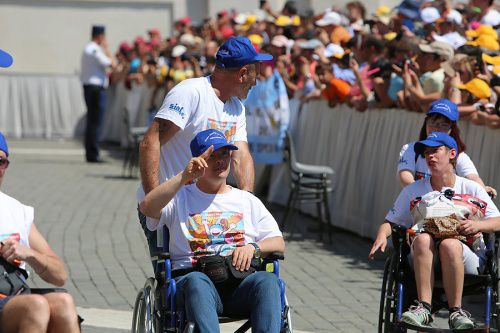A Vatican conference dedicated to the up-and-coming 'theology of disability' aims not only to end common stigma surrounding persons with disabilities, but to show that their lives are a gift and to help integrate them more fully into the life of the Church and of society.
“The disabled person’s life has never been more in danger as it is now, before life and after,” Cristina Gangemi told CNA in an interview.
Co-director of The Kairos Forum and an expert in intellectual and cognitive disability with a particular focus on spirituality, Gangemi and her organization are partnering with the Pontifical Council for Culture in putting on the “Living Fully 2016” conference later this week.
Society, she said, “is seeking to develop the perfect human person,” and in doing so renders the life of the disabled “mechanistic.”
Rather, “the disabled person calls you back to love, because they say: ‘I look differently, I think differently, I’m a creative learner, I do things in a way that’s not typical, but do you love me?’ And it calls society to answer to the question: ‘Do you love that human person?’”
More importantly, persons with disabilities pose the same questions to the Church, she said, adding that the Church’s response must reflect Pope Francis’ call to love and mercy.
Gangemi said this reflection doesn’t come from feeling sorry for disabled persons, “but that we feel sorry for the way we’ve treated them. We’ve created a community of ‘them and us,’ and we must remove that and get back to a community of ‘us,’ because within the body of Christ there is only us.”
The Living Fully conference in Rome is being held June 23-26, beginning with a symposium on “Exploring Disability, Theology, Practice and Culture.” That will be followed by a three-day conference titled “Disability, Culture, Family and Faith — a Celebration,” hosted by LUMSA University.
Topics that will be covered include how to see the disabled with God's eyes' the Church's attitude and practice in welcoming disabled persons; the gift of our bodies as they are in light of St. John Paul II’s Theology of the Body, and how to end and the problems of isolation and loneliness often experienced by persons with disabilities.
Personal stories from people with one or more disabled family members will also be given throughout the conference.
Gangemi explained that the 'theology of disability' is “a new, emerging discipline” and is born from the experience of both disabled persons and their families, as well as the desire to explore their place and value in the Christian community.
The pioneer behind disability theology is John Vanier, a Catholic philosopher, theologian, and humanitarian from Canada.
In 1964 Vanier founded L’Arche foundation, which has grown to become an international federation of communities for people with developmental disabilities, and is present in 35 countries around the world.
According to Gangemi, the essence of disability theology can be defined as “a way of exploring the Christian Gospel and the very essence of God through the life experiences and expressions of people who’ve been disabled.”
While Vanier is Catholic, the story of L’Arche and the study of disability theology have been taken up especially by members of the Anglican Communion, Gangemi said, explaining that because of this the conference will also feature ecumenical speakers.
As someone who has been working in the field for more than 20 years, Gangemi said that while Catholic theologians are taking an increasing interest in disability theology, “it’s a missing bit of what we do as a Church.”
“Disability isn’t a special occasion, it’s an everyday occurrence, it’s part of who we are as Church,” she said, voicing her hope that the fact that LUMSA University is hosting the conference will help to ensure that disability theology “is part and parcel of what universities and Catholic studies have in the future.”
One concrete sign of the Church’s increasing interest in persons with disabilities is the recent Jubilee of the Disabled, held June 10-12 as part of Pope Francis’ wider Jubilee of Mercy. During the jubilee, Pope Francis said discriminating against the disabled is “ugly,” and insisted such persons ought to be loved, rather than hidden from society.
Gangemi said that in her opinion, while the topic of disability theology has always been needed in the Church, the need is more dire today due to the “urgent drive to obtain the perfect human.”
“The disabled person still lives in a very paradoxical place,” she said, noting how currently in the UK, the only factor allowing parents to get a full-term abortion at 40 weeks gestation is for reasons of fetal disability.
“Even the day that you’re born, (right) before you’re born if you’re known to have a disability and it’s decided that you shouldn’t exist, you can be aborted.”
The paradox, she said, is that if the disabled child survives pregnancy and is born, they are then protected by legislation which deems them “an equal and valued human being” and provides for their needs.
With the Church “it’s the other way around,” she said. “Because of our stance on life as gift and our protection of the unborn child, the disabled person’s life is totally respected and valued.” But once the disabled child is born and baptized, “there’s almost nothing for them to do.”
“So the theology of disability doesn’t say it’s about belonging, it says ‘what are you going to do in your parish, and how are they going to belong?’”

